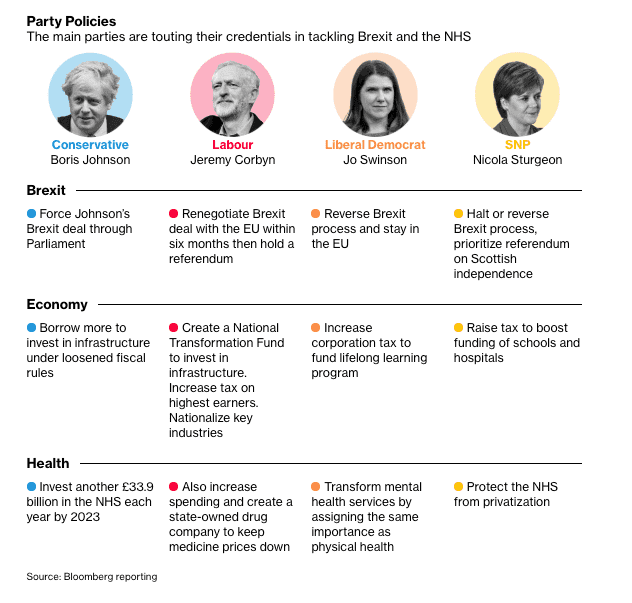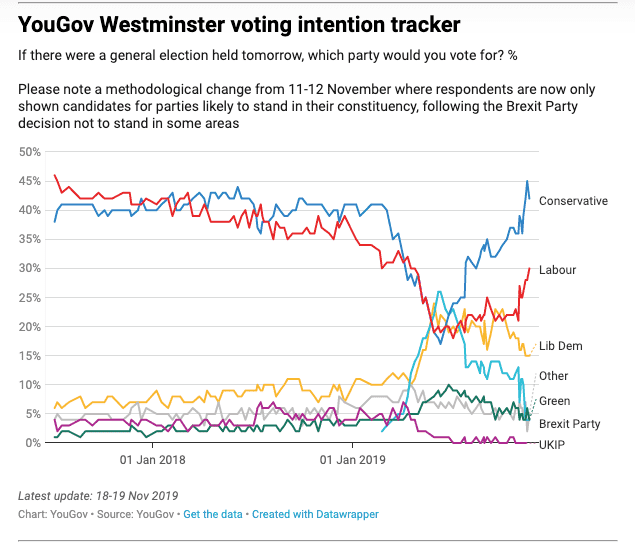Brexit has started to resemble a protracted family row in which too many hurtful things have been said; one that leaves everyone exhausted and unsure of their original positions. Three years on and the painful saga continues. With a general election now standing between the United Kingdom and its exit from the European Union, which recent events that have led us here, and what does this second snap election under the shadow of Brexit mean for the future of Britain?
You can read a more in-depth Brexit 2020 Forecast here.
Brexit Postponed to 2020
On October 17-18th, British prime minister Boris Johnson and EU officials hammered out a revised Brexit deal at the EU Economic Summit in Brussels. Boris Johnson then returned to the UK tasked with getting this new deal through parliament. On October 22 a vote was held to pass or reject the revised European Union Withdrawal Agreement Bill. It passed. Then a second vote was held on the government's “programme-motion” to fast-track the bill so that the UK could withdraw with a deal before its October 31 deadline. This second vote was rejected.
With a deal in hand, but not enough time to get parliament to push it through before the Brexit deadline, Boris Johnson attempted to call a snap election. His initial attempt was blocked by parliament. On October 28, the EU agreed to extend the deadline for Brexit until January 31, 2020. European council president, Donald Tusk, tweeted that the remaining EU27 had agreed to grant the UK a “flextension” until the end of January. On October 29, MPs accepted the proposed December 12 election date and the campaigning began.
U.K. Election Policy Commitments

Labour has announced an ambitious plan to re-nationalize a part of British Telecom in order to offer free high-speed broadband access to everyone in the UK by 2030. The conservatives have promised 6000 new doctors for the National Health Service and have even made a bid for the centrist vote with a “vote blue, go green” environmental campaign. Meanwhile, the Liberal Democrats have promised an extra £35 billion to the NHS by raising taxes by a penny and have also pledged £100 billion to a climate fund.
This may be typical of the type of campaign one-upmanship you’d expect to see in the run-up to an election, however with the Brexit battle lines clearly marked out, these secondary issues will be important in swaying certain contested seats. According to YouGov, the top five issues facing the country are Brexit, healthcare, the economy, the environment, and housing. Despite this, there’s a palpable sense that no matter how each party attempts to shift the agenda, these shifts are still subordinate to Brexit and can be compromised on. This is plain to see in the leave and remain alliances that are forming.
U.K. Election: Brexit Outcomes
With the election date announced, parties have been scrambling to form alliances on either side of the leave or remain divide. On the 11th of November, Nigel Farage announced that his Brexit Party would not be contesting any of the 317 seats that the Conservative Party won during the last election. Since both parties are effectively after the same thing—immediate exit from the EU—logic dictates that any action to scupper a Tory majority threatens Boris Johnson’s Brexit agreement from being implemented, which is currently the leave side’s best bet.
Farage will, however, stand in some 300 other seats held by the Labour Party, the Liberal Democrats and the Scottish National Party. Interestingly, prior to his announcement, the favourite outcome among oddsmakers was no party having an overall majority. Since Farage’s withdrawal from Tory-held areas, the favoured outcome has now shifted to a Conservative majority. On 2nd December, U.K. betting markets were implying the odds of a Conservative majority outcome at approximately 66%.
The matter is a little more complicated on the remain side. The Liberal Democrats are aligned with smaller parties such as the Green Party, Plaid Cymru (the Welsh Nationalists) and the centrist Renew Party. The Lib Dems can’t have anything to do with Labour if their leader, Jo Swinson, is to appeal to Conservative remain voters. The Scottish National Party, while technically in the remain camp has its own agenda of Scottish Independence. The Labour Party has perhaps the most nuanced position. It can’t risk alienating leave voters by being openly in favour of remaining, so it has pledged to both negotiate Brexit while also putting whatever deal it secures to the voters in a second referendum.
Is it much ado about nothing though? On a recent Channel 4 News segment, political analyst professor John Curtice was emphatic on what he believes this election is truly about. After stating that the chances of a Labour Party majority are effectively zero, he continued by stating: “That’s not what this election is about, this is an election of choice between if Boris Johnson gets a majority or not.”
U.K. General Election Polling Tracker

Curtice’s view certainly correlates with what the polling data is suggesting. At the time of writing, YouGov gives a 45% chance of a Conservative majority, a 30% chance of a Labour victory, a 15% chance of a Liberal Democrats majority and a 4% chance for The Brexit Party.
Of course, were anything to cause the Conservative majority to fall further, then the not insubstantial sixty or so contested seats that the remain alliance was hoping to disrupt may become even more important.
Brexit Consequences
In a recent speech, Donald Tusk shared his personal views on the prospects of a post-Brexit Britain. With negotiations now over and the ball firmly in Britain’s court, he opened by stating: “I want to tell you something I wouldn’t have dared to say a few months ago, as I could be fired for being too frank.” He proceeded to comment on the Brexit contingent’s claim of wanting to make Britain global again by leaving the EU, saying that you could hear a longing for empire in their voices. The reality, he explained is “exactly the opposite”. That “only as part of a united Europe can the UK play a global role.”
For new IMF managing director, Kristalina Georgieva, who recently replaced Christine Lagarde, the point of the recent developments in the Brexit story is that a deal removes uncertainty from a global environment that is already very high in uncertainty. She argues that Brexit has already been priced in and that a deal and subsequent orderly exit would likely be positive for global markets. On the other hand, according to the IMF’s calculations, a no-deal Brexit costs the UK from 3.5% to 5% of its GDP, while only costing the EU around 0.5%.
There’s also the possible wild card scenario that somehow, we end up with a hung parliament, which ends up putting a second Brexit referendum back on the table. The youngest eligible voters on Dec 12th are old enough to have observed the entire Brexit debacle unfolding without having been able to do anything about it, and it’s no secret that the younger demographic skews more to remain and the older to leave.
Another issue that the young skew disproportionally towards is economic redistribution, a topic that is also going to take a prominent place in this election if Labour has anything to do with it, and one that could complicate matters for the Conservatives. So, will we soon consign the term Brexit to the dustbin of history, or will it continue to dominate the headlines throughout 2020? It looks like we still must watch this third act unfold before we can find out either way.
About HYCM
HYCM is the global brand name of Henyep Capital Markets (UK) Limited, HYCM (Europe) Ltd, and HYCM Ltd, all individual entities under Henyep Group, a global corporation founded in 1977, operating in Asia, Europe, and the Middle East.
High Risk Investment Warning: CFDs are complex instruments and come with a high risk of losing money rapidly due to leverage. 67% of retail investor accounts lose money when trading CFDs with this provider. You should consider whether you understand how CFDs work and whether you can afford to take the high risk of losing your money. For more information please refer to HYCM’s Risk Disclosure.
